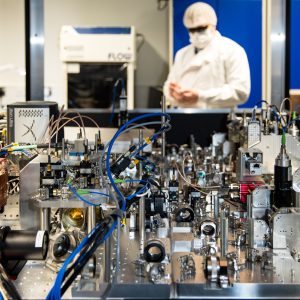
Fujitsu has built a 64-qubit superconducting quantum computer with Japan’s Riken research institute. It has been designed to accelerate R&D for chemistry calculations and to run financial algorithms. It will be available as part of a new hybrid quantum computing platform run out of the Riken-RQC-Fujitsu Collaboration Centre.

Fujitsu is leading the development of quantum computers in Japan and plans to continue working to improve the technology as countries around the world strive to develop usable quantum machines.
The new computer includes a quantum processor and has a vertical wing scheme to allow it to be scaled in future as more advanced quantum processors come online. It allows for calculations up to two 64 quantum superposition and entanglement states. This is expected to enable calculations on a scale that has been difficult to achieve with classical computers.
Fujitsu says combining the power of quantum with classical hardware makes scaling easier and reduces the noise and error rates from the current noisy intermediate-scale quantum (NISQ) computer. Its results are checked against error-free results from quantum simulators running on classical machines, contributing to accelerated research in areas including performance evaluation of error mitigation algorithms in quantum applications.
Alongside Riken, Fujitsu is also building hybrid quantum algorithms to link superconducting quantum computing with high-performance computing. One of the first is a quantum chemistry calculator that provides “greater accuracy than conventional algorithms”. This will be on the new hybrid platform. As well as being available as a stand-alone platform, the hybrid service is being made available as a serverless computing service on AWS Lambda.
Futijsu and Riken: simulation and future plans
The pair are now working towards a 1,000-qubit superconducting quantum computer and technologies to improve the precision of its quantum gate operations. This will reduce noise and make it more effective and accurate. “The creation of reliable computing results with quantum computers, however, represents an ongoing challenge, as current NISQ systems are still suffering from computing errors due to noise in the surrounding environment,” Fujitsu explained in a statement.
The realisation of practical fault-tolerant quantum computing that can provide accurate results without noise is likely about a decade away. However, companies like Quantinuum suggest this could appear by the turn of the next decade and are already building logical qubits that can run some fault-tolerant algorithms. IBM also predicts some degree of quantum advantage in a similar time frame.
These future machines will also need quantum applications and, with the help of quantum simulations – where quantum circuits are simulated on GPUs and classical supercomputers – Fujitsu says it is well on the way to being ready. The quantum simulators are able to run error-free and long-step computations as they do not rely on the error-prone qubits that make up the processing power of a quantum machine.
However, as quantum hardware improves, the simulators will become less useful and Quantinuum predicts the first quantum computer that can’t be simulated by classical hardware will come online next year.
Yukihiro Okuno, senior research scientist in the analysis technology centre at Fujifilm, which is working with Fujitsu on chemical simulation work, said: “We anticipate that the ultrafast computing power of quantum computers enables unprecedented high-precision chemical calculations, which will greatly contribute to materials development.
“Fujifilm will leverage the new hybrid quantum computing platform to research the effects of noise on current quantum computing results. We will also continue to develop innovative materials through the application of quantum computing.”






